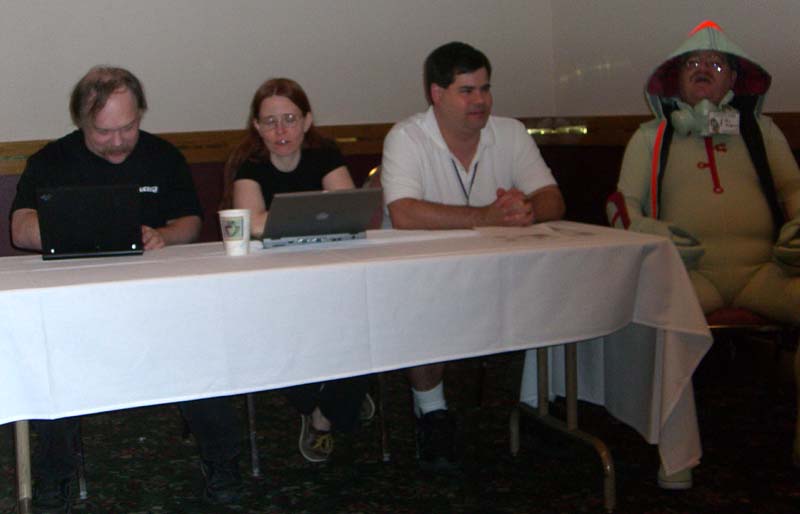Linucon 2005: Authors We Gave Up On
Synopsis. To quote from Linucon program book: “What does it take for an author you used to really like to honk you off so badly that you won’t read him or her any more? Our panelists discuss cases.” The panelists were Eric and Cathy Raymond, Lawrence Person and Jay Maynard, a. k. a. The Tron Guy. (On this panel he was dressed as a guard program from Tron.)
To be accurate, “authors” in this case meant “science fiction authors”.
The worst offender: Orson Scott Card
The worst offender, or the one panelists feel most strongly about: Orson Scott Card. Lawrence is disappointed by the Alvin Maker series, while ESR is put off by Ender books. Maybe not “Ender’s Game”, but some of the subsequent books in the series. ESR thinks that Orson Scott Card is incapable of moral reasoning, or something like that. IIRC, he thinks Orson Scott Card characters (most notably, Ender) reach wrong moral conclusions from their experiences.
Other offenders:
Frank Herbert. Frank Herbert also has turned a lot of people off. Jay Maynard says the “Dune” trilogy was at least 2-3 books too long. “Trilogy” as in 6 books, and that’s not counting posthumous collaborations!
Posthumous “collaborations” of living writers with the dead authors, or rather their greedy offspring, are subject to much disdain by the panelists. Lawrence has an entire arsenal of barbs for this particular phenomenon: industrial necrophilia, a frat boy in the closet with Asimov’s naked corpse, and such.
Harry Turtledove. Jay Maynard likes to badmouth Harry Turtledove. Eric Raymond, while he likes a lot of Harry Turtledove’s stuff, agrees with Jay on this author’s alternative history Civil War series. Turtledove, he says, doesn’t bother to write a nice story, because he is paid by the word.
I can explain Turtledove, says Eric Raymond. He is supporting 4 daughters. Even in the best of times his prose is quite pedestrian, plows like a truckhorse [?]. The economic circumstances under which he labors are not favorable to good taste.
Cathy Raymond had given up on George R. R. Martin, because she got tired of unredeeming horror he visited on protagonists she has come to like.
Eric Raymond also gave up on Catherine Asaro who started out writing excellent space operas with good hard science in the background, and ended up writing goopy romance novels under the pretense of science fiction.
A discussion Philip K. Dick’s place in science fiction, and Eric Raymond’s opinion of what REAL science fiction is
A discussion ensues about Philip K. Dick’s place in science fiction. ESR thinks that Philip K. Dick is most popular among people who don’t understand science fiction. Lawrence objects that if everything in SF had descended from Heinlein and there was nothing from Dick, the genre would be immensely smaller. It needs the darkness that it got from Philip K. Dick.
Left to right: Eric Raymond, Cathy Raymond, Lawrence Person, Jay Maynard

As an example of dark work that makes everything brighter, ESR thinks Tim Powers is a much better example of that than Philip K. Dick. Not only that, but in his opinion Powers is more of a science fiction writer than Dick, because the fundamental characteristic of SF is that it promulgates that universe is ordered and is ultimately knowable. That’s Gregory’s Benford’s definition, to which ESR apparently subscribes. But Philip K. Dick was perpetually struggling against the idea that the universe had any order at all.
Lawrence says that Benford’s definition would exclude a lot of work that’s included in the science fiction canon.
A guy in the audience says Philip K. Dick is probably the only author who benefits from someone coming in, picking up a few pieces of his work and turning it into a nice, simple space opera, instead of paranoid madness.
How William Gibson’s sense of humor is like the microwave background radiation of the universe
Another audience member says he gave up on William Gibson after “Pattern Recognition”. Lawrence agrees. As he said in this article that discusses the recent works of the cyberpunk classics, Cyberpunk after 9/11, in “Pattern Recognition” Gibson wrote an exquisitely beautiful novel of excruciating tedium.
Lawrence’s friend Dwight, who was sitting in the audience, suggested that “Pattern Recognition” is Gibson’s attempt at slapstick. Lawrence doubts it, because, as he says, William Gibson’s sense of humor is like the microwave background radiation of the universe: it takes a very finely calibrated instrument to read it. And to be able to tell it from pigeon dung on your telescope, adds a guy named Andrew from the audience.